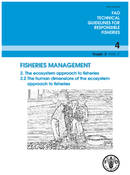出版物
These Guidelines have been developed in response to requests for further information on the practical adoption and application of the ecosystem approach to fisheries (EAF), with a special focus on its human dimensions. As implementation of EAF is a human pursuit and takes place in the context of societal goals and aspirations, the human forces at play need to be understood and considered – these include policies, legal frameworks, social structures, cultural values, economic principles,...
These International Guidelines for the Management of Deep-sea Fisheries in the High Seas were developed through a participatory process involving fisheries experts, fishery managers from governments, the fishing industry, academia and non-governmental and intergovernmental organizations. The guidelines are designed to provide guidance on management factors ranging from an appropriate regulatory framework to the components of a good data collection programme, and include the identification of key management considerations and measures necessary to ensure the conservation...
This circular provides an assessment of the technical practicability, advantages, constraints and cost of using electronic reporting as part of the biennial survey on the implementation of the 1995 FAO Code of Conduct for Responsible Fisheries. In this context, electronic reporting is defined as conducting a survey (questionnaire) electronically in a format that enables statistical analysis and reports to be generated without re-entering the survey information manually. Two types of electronic reporting are investigated: spreadsheet-based...
These Guidelines have been produced to support implementation of the International Plan of Action for Reducing Incidental Catch of Seabirds in Longline Fisheries (IPOA-Seabirds). They are addressed to decision-makers and policy-makers associated with conserving seabirds and with minimizing their interaction with fishing gears, but the Guidelines should also be of interest to fishing industries and other parties.
The IPOA-Seabirds is consistent with the FAO Code of Conduct for Responsible Fisheries, agreements from the 1995 United Nations...
This circular analyses the implementation and the impact of the FAO Code of Conduct for Responsible Fisheries since 1995. In doing so, it first establishes a picture of fisheries and aquaculture sectors before the publication of the Code and 13 years after, in order to detect major changes in both sectors. While fundamental changes in the fisheries sector remained few, the aquaculture sector displays a rather important degree of change, where practices in farm management...






